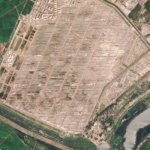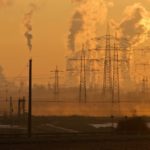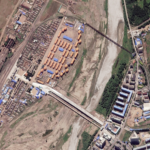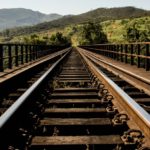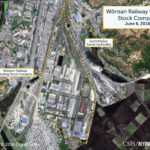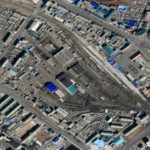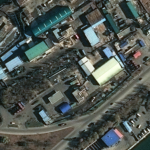August 26, 2022, by Joseph S. Bermudez Jr., Victor Cha and Jennifer Jun—
Built on the former grounds of Yonpo Airbase, the Yonpo Vegetable Greenhouse Farm is a top-priority project for North Korea and, once completed, will become North Korea's largest agricultural greenhouse complex... The Yonpo Vegetable Greenhouse Farm is a major new agricultural project being undertaken as a…
September 30, 2021, by Joseph S. Bermudez Jr.—
While North Korea’s public demonstration of a rail-mobile missile launch platform earlier this month may have caught some by surprise, the country’s interest in developing such a capability reports back several decades... This article was originally published as a CSIS Korea Chair Platform. North Korea’s demonstration of…
March 17, 2021, by Joseph S. Bermudez Jr., Victor Cha, Marie DuMond, Jonathan E. Hillman and Maesea McCalpin—
Although significant political barriers remain to reconnecting the Korean peninsula, there is merit in substantive study of the types of energy infrastructure connections that would best promote regional growth and stability. The cases examined in this report underscore North Korea’s dire need for energy infrastructure investment and the importance of it meeting the G20 quality infrastructure investment principles.
May 4, 2020, by Joseph S. Bermudez Jr. and Marie DuMond—
Widely considered as a midterm referendum on President Moon, the April electoral victory will breathe new life into his administration’s heretofore stalled diplomatic efforts with North Korea, a key pillar of which is inter-Korean railway cooperation. In the context of South Korea's renewed efforts in inter-Korean railway cooperation, Beyond Parallel reviews the railway connections of the Korean peninsula.
July 22, 2019, by Joseph S. Bermudez Jr. and Victor Cha—
Satellite imagery shows that the new Namyang-Tumen road bridge connecting North Hamgyong province in North Korea with China is nearing completion and could be open to traffic as early as the end of 2019... Satellite imagery shows that the new Namyang-Tumen road bridge connecting North Hamgyong province in North…
January 7, 2019, by Victor Cha, Joseph S. Bermudez Jr. and Marie DuMond—
Should inter-Korean cooperation result in the re-connection of the railways in North and South Korea, the rail networks of the Korean peninsula could then be integrated into a rail network spanning the Eurasian continent through China and Russia. If actualized, this would mark a significant diplomatic and geopolitical accomplishment for the Korean peninsula. Nonetheless, a long and significant modernization process will need to take place to fully integrate the systems in a commercially viable way.
December 10, 2018, by Victor Cha, Joseph S. Bermudez Jr. and Marie DuMond—
North and South Korea are moving forward with inter-Korean railway cooperation as a key engine for advancing inter-Korean reconciliation and building the infrastructure for eventual unification. Once connected, however, a significant modernization and harmonization process will need to take place to fully integrate the systems in a commercially viable way.
July 9, 2018, by Victor Cha, Joseph S. Bermudez Jr. and Marie DuMond—
Commercial satellite imagery shows that the Wonsan Railway Rolling Stock Complex is currently active and appears to be well maintained by North Korean standards. In addition to its production and repair responsibilities, the complex serves as a center for North Korean railroad technical research and development.
May 22, 2018, by Joseph S. Bermudez Jr., Victor Cha and Marie DuMond—
Chongjin Railway Factory is one of three major railway manufacturing facilities in North Korea's eastern corridor. Analysis of this facility can be a brick-and-mortar sign-post of foundational infrastructure progress if the trust-building project of reconnecting the Koreas' railways is carried out.
December 21, 2017, by Joseph S. Bermudez Jr. and Lisa Collins—
In July and September 2017, unconfirmed reports circulated about dramatically fluctuating gasoline and diesel prices in North Korea. There were also reports that China was planning to suspend or limit fuel exports to North Korea. Analysis of satellite imagery from around this period indicates that a fuel suspension of any significant length does not appear to have affected Pyongyang.
